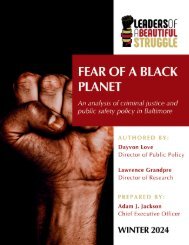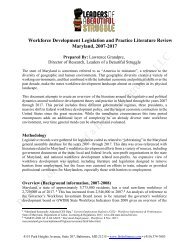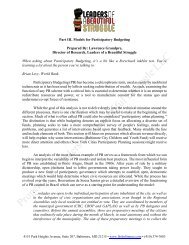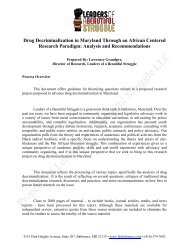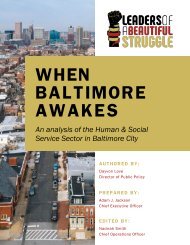The Communal Impacts of Drug Criminalization in Maryland
This project attempts to reframe the harms of drug criminalization. Influenced by African-Centered Research Methodologies, we engaged in a literature review and qualitative research of the communal impacts of drug decriminalization in Maryland, with a specific focus on Baltimore.
This project attempts to reframe the harms of drug criminalization. Influenced by African-Centered Research Methodologies, we engaged in a literature review and qualitative research of the communal impacts of drug decriminalization in Maryland, with a specific focus on Baltimore.
You also want an ePaper? Increase the reach of your titles
YUMPU automatically turns print PDFs into web optimized ePapers that Google loves.
Reparations Means Community Repair, not<br />
Reconciliation or Reform<br />
“In my work as a mental health provider, it was about<br />
reconnect<strong>in</strong>g to ancestral connection and veneration around<br />
who our people were. It was about po<strong>in</strong>t<strong>in</strong>g out where<br />
Eurocentric or whitewashed or White supremacist ideals have<br />
been embedded with<strong>in</strong> us. For example, African-American folks<br />
not want<strong>in</strong>g to be Black, or seek<strong>in</strong>g to have proximity to<br />
whiteness. So, if we're th<strong>in</strong>k<strong>in</strong>g about this, how I might support<br />
a person that maybe is struggl<strong>in</strong>g with addiction or navigat<strong>in</strong>g<br />
systems, I would first def<strong>in</strong>e community from an African-<br />
Centered perspective that is not reliant on white ma<strong>in</strong>stream<br />
<strong>in</strong>stitutions and is not led by or ma<strong>in</strong>ta<strong>in</strong><strong>in</strong>g any level <strong>of</strong> power<br />
over them.<br />
…decrim<strong>in</strong>alization would be easier, if we had more voices <strong>of</strong><br />
folks that had some critical consciousness experience where<br />
they had the ability to see themselves <strong>in</strong> their own life, see it,<br />
alongside what's happen<strong>in</strong>g politically, and then beg<strong>in</strong> to<br />
advocate and be supported by funded community supported<br />
and advocated, so that they could be <strong>in</strong> the face <strong>of</strong>, and be<br />
supported collectively, and transform<strong>in</strong>g everyth<strong>in</strong>g that we<br />
th<strong>in</strong>k about when we th<strong>in</strong>k about why people use drugs. <strong>The</strong>y<br />
use drugs because they are try<strong>in</strong>g to connect to spirit or are <strong>in</strong><br />
deep, deep pa<strong>in</strong> and try<strong>in</strong>g to numb that pa<strong>in</strong>. How can we<br />
create a space where everyone feels like they don’t have to<br />
escape through a substance to heal their pa<strong>in</strong>?”<br />
Our research shows that the very def<strong>in</strong>ition <strong>of</strong> reparations needs<br />
to become a critical site <strong>of</strong> political contestation. Interviews did<br />
not predom<strong>in</strong>antly use a “racial equity and <strong>in</strong>clusion” frame,<br />
claim<strong>in</strong>g that successful decrim<strong>in</strong>alization would lead to equal<br />
access to exist<strong>in</strong>g <strong>in</strong>stitutions, but an <strong>in</strong>stitution build<strong>in</strong>g<br />
framework, which centered on the production <strong>of</strong> new,<br />
community-controlled <strong>in</strong>stitutions to meet essential needs.<br />
<strong>The</strong> def<strong>in</strong>ition <strong>of</strong> reparations presented by the <strong>in</strong>terview subjects<br />
did not center on repair<strong>in</strong>g the divide between oppressed and<br />
oppressor by grant<strong>in</strong>g the oppressed <strong>in</strong>creased access to exist<strong>in</strong>g<br />
political and social service <strong>in</strong>frastructure, but <strong>in</strong>stead on us<strong>in</strong>g<br />
public <strong>in</strong>vestment to build up the <strong>in</strong>frastructural capacity <strong>of</strong> the<br />
oppressed, so they were no longer dependent on the goodwill <strong>of</strong><br />
the oppressor for their survival.<br />
<strong>The</strong> <strong>Drug</strong> Policy/Decrim<strong>in</strong>alization advocacy communities'<br />
<strong>in</strong>attention to the dynamic <strong>of</strong> self-determ<strong>in</strong>ation was not seen as<br />
unique to harm reduction or decrim<strong>in</strong>alization advocat<strong>in</strong>g, but<br />
an extension <strong>of</strong> the larger society paradigm <strong>of</strong> denigration <strong>of</strong><br />
Black communities' capacity for self-governance, as one<br />
<strong>in</strong>terviewee noted:<br />
12 <strong>of</strong> 55




